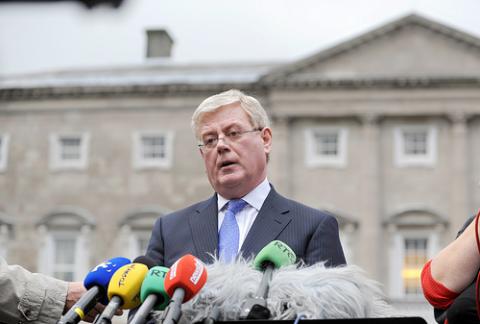Labour's dangerous paralysis

With the collapse of the Celtic tiger, there was a chance for Labour to change minds radically by arguing for a society fired by social solidarity rather than profit and narrow self-interest - but the party flunked it. By Vincent Browne.
On RTÉ Radio 1's Liveline programme last week, a woman was excitedly demanding that everyone should share the pain of the budgetary adjustment, and that complaints about the reduction in the First Communion allowance were absurd.
She said it was ridiculous to insist that social welfare should not be cut. Host Joe Duffy intervened to characterise the woman's arguments as "equality of pain" which, on the face of it, sounded fair enough. The late Brian Lenihan was of a similar view; he thought it was essential to social solidarity that everyone should share the pain. For that reason, he thought the universal social charge was a great idea, encompassing people previously considered too poor to pay income tax.
That would be fine if we were all sharing the pain to begin with. But the reality is that pain is very unevenly distributed - or at least it is in terms of the pain of coping with deprivation, a persistent sense of belittlement, inadequate education, restricted access to healthcare, low wages and often poor mental health. The idea that any additional pain should be shared equally is merely an exacerbation of the gross inequity that currently prevails.
We are a very rich society, even if we are to bear the full burden of the banks' losses. The problem is that the riches are so unfairly distributed.
There might have been an expectation that a coalition government including the Labour Party might have been sensitive to these considerations. But, aside from the occasional rhetorical blather about fairness and protecting the vulnerable, it might just as well have been a reincarnation of the Progressive Democrats that went into office with Fine Gael. This is not because of any moral delinquency on the part of Eamon Gilmore, Pat Rabbitte, Joan Burton, Brendan Howlin et al, for these are people of moral probity.
The problem is that they, and others, are fixated with disabling mindsets. One of those mindsets is that only by the exercise of power through ministerial office can political change happen. Another is that the current order of society is the best we can do, although some tinkering around the edges is possible. The final paralysing mindset is that our masters in Europe cannot be defied.
It is certainly possible to use ministerial office to make substantial change, not through the exercise of ministerial power in the conventional sense, but rather through the use of the ministerial platform to challenge settled assumptions, such as the "equality of pain" idea propagated by the late Lenihan and, indeed, Joe Duffy. Ministers are impotent at making substantial societal change without first persuading a large part of the electorate that substantial societal change is both possible and desirable.
In the 14 years Labour was in opposition, it made no effort to change settled mindsets. It never argued for a significant redistribution of the riches generated by the Celtic tiger. Instead, its eye was on the floating middle-class voter, and the party's impulse was to avoid antagonising those voters and, if possible, win their support. This would be achieved, not by challenging their settled neoliberal convictions and persuading them of another way, but by deferring to those settled neoliberal convictions.
With the collapse of the neoliberal poster hero, the Celtic tiger, there was a chance to change minds radically by arguing for a society fired, not by profit and narrow self-interest, but by social solidarity - but Labour flunked it. During the election campaign, when Fine Gael accused it of being a high-tax party - ie, a party that wanted to use the taxation system to redistribute wealth - Labour's response was to protest that it had no such redistributive agenda.
It knew that not to do so would perhaps be to forfeit all the fruits of ministerial office to Fine Gael, because it had made no effort over the previous years to create a constituency of radical change in our society. Office was its primary focus, not social change.
And that final mindset - that our European masters cannot be defied - is the most paralysing of all, and may paralyse this country for generations.
It is clear now that no insistent and persistent effort was made to have the banking debt written off, or at least written down. The significance of this is simple: arbitrarily, the Irish people are required to bear a massive debt burden they did not incur, around €65 billion, on top of the State debt burden, to benefit financial elites around Europe.
But not just that. We are also required to buy into a penal economic and fiscal discipline that will enforce (reasonably, in my opinion) fiscal rules to protect a common currency, but also an economic discipline which will consolidate the present inequitable distribution of wealth, income, power and privilege here and, over the years, intensify that inequality - for that is the consequence of a society driven by unrestrained markets.
There could not be a more savage negation of what one might assume a Labour Party would stand for and, yet, not a peep from the party, other than the bleat "there is no alternative".
The only equality remaining on the Labour agenda is an equality of pain, and that is an equality of additional pain. And they will renege even on that.
Image top: The Labour Party.
